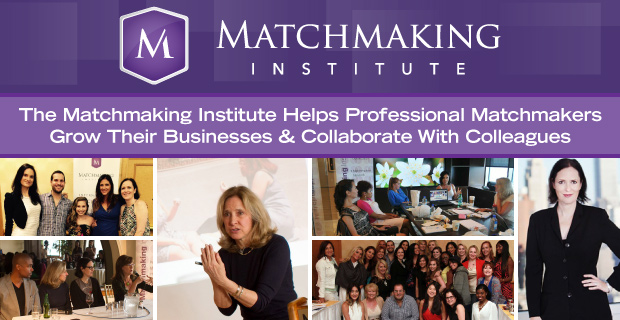The Christian Science Monitor – April 20, 2005
After trying everything from online match sites to 10-minute dating, an increasing number of singles are going the old-fashioned route.
By Kim Campbell, Staff writer of The Christian Science Monitor / April 20, 2005
NEW YORK
If Yente, the matchmaker from “Fiddler on the Roof,” were with us today, she would probably be a multimillionaire. Finding a meaningful relationship is so important to American singles that this age-old tradition is now a hip new career. But today’s matchmakers are more likely to look as if they walked off a runway than stepped out of a shtetl.
For centuries, arranged marriages were the norm in many parts of the world, and engaged couples had little say about whom – and when – they would marry.
But for people who are tired of looking for love on their own, what’s old is definitely new. Those opting for the “Fiddler” approach range from businessmen to Muslims, retirees to gay men.
“We’re getting hundreds of singles, I mean hundreds of singles, saying, ‘I want to find a matchmaker,’ ” says Lisa Clampitt, a matchmaker and the executive director of the Matchmaking Institute in New York, a training program for wannabes and a resource for singles. “I have a pile [of requests] in front of me like you wouldn’t believe.”
Driving some of the interest is a desire to explore options beyond personal ads, speed dating, and the Internet. Despite the popularity of online dating sites, some find the process too time-consuming. Some people are also looking for options that offer more privacy and security.
“Anybody can say what they want to say online,” says Cindy Cleckner, a schoolteacher in her mid-40s. “How do I know the person’s [really] divorced? How do I know they’re not a stalker? How do you know they’ve not had a criminal background?” Such concerns led her to use a matchmaker near her home in Camp Hill, Pa., to find the man she’s currently dating.
Ms. Clampitt’s school has trained many modern matchmakers, including a number of men, since its debut in 2003. Brandon Dean is a 20-something trying to get his business off the ground in Fort Smith, Ark. (He’s still trying to convince people in the city of nearly 100,000 that it’s not an “escort” service.)
And there’s Samantha Daniels, the inspiration for the short-lived 2003 TV show “Miss Match.” She’s a former divorce attorney (a profession that inspires many to try their hand at matchmaking), and is a single, 30- something who divides her time between Los Angeles and New York.
Despite her urbane credentials, when it comes to matching, she does it the old-fashioned way. “When I take on a new client, I actually sit and thumb through all the people [in my database], one by one thinking to myself, ‘Who would go well with whom?’ I don’t have one of those fancy computer programs where I plug in pieces of information … and they generate me a list.”
Labor of love
In New York, 20-somethings Fatima Fasihuddin and her husband, Saleem Qureshi, moonlight as matchmakers for Muslim singles through their business called Zariya. They work directly with the singles – unlike older matchmakers in the Muslim community, who are often hired by a woman’s parents, for example. The couple has set up people on both coasts.
“We spend a lot of time getting to know our clients, we’re pretty much like their friends,” says Ms. Fasihuddin, a production assistant at ABC News. “We just want to see people happy. It’s so difficult nowadays to meet [single] people, whether it be the Muslim community or the Christian community or the Jewish community.”
Fasihuddin and her husband charge only a small amount for their services – $50 per introduction, plus a $50 one-time registration fee – but typical matchmaking fees range from a few hundred dollars to $10,000 and up. Matchmakers typically offer clients a certain number of introductions or work with them for a specified time. They may also offer other services, such as dating and appearance coaching. But they don’t guarantee a match, and they rarely, if ever, offer a refund.
Be realisticTo figure out who best suits clients, a matchmaker typically might spend an hour or two interviewing them about their background, their likes and dislikes, and assessing who they expect to end up with. Ms. Daniels, whose packages start at $10,000, says she’s turned away people who had unrealistic expectations.
“There are a lot of people who come to matchmakers and think that they’re paying all this money so they should get their fantasy person. And that’s really not what it’s about. It’s about the reality of saying, ‘I want to get married, and I want somebody to help me find the best possible person for me,’ ” says Daniels, author of “Matchbook: The Diary of a Modern-Day Matchmaker.”
Ms. Cleckner, the schoolteacher, gulped when she had to pay more than $1,000 for the services of a matchmaker at Matchmaker International in Harrisburg, Pa. But she reasoned that people willing to pay that much are probably interested in a serious relationship – not just looking for a good time.
“It gets down to, would you rather have the $5,000 in your bank, or the person next to you?” says Doug Anter, a 30-something from the Detroit area, who recently enlisted the help of a matchmaker.
“When you reach a certain age and a certain maturity level, traditional methods [of dating] aren’t as effective as they used to be,” he adds.
Clients of matchmakers say that, as in regular dating, they sometimes have to go out with a few people before they find someone that’s a good match, if they click with anyone at all. Rich, a divorced attorney in his 50s, who asked that his last name not be used, decided to hire matchmaker Carol Morgan after he saw her ad in a magazine. His social life had been fairly limited thanks, in part, to a job in a somewhat rural area.
“I knew there were services like that, but I really didn’t know what they did,” he explains. “If you’re a busy professional, [a matchmaker] really takes a lot of the labor out of it.”
His initial set-ups were only so-so. But then Ms. Morgan contacted him about someone else. He almost didn’t call the prospect because she lived in another state. But Morgan “was very emphatic…. It’s almost like she knew.”
He and the woman hit it off right away on the phone. They met in person in the summer of 2003 and were married in July of 2004 – choosing to continue living in different states for a few more years until one of them can retire.
“It’s almost like an art, a gift, if you will, knowing who is going to be a good match for someone else,” says Morgan, a former financial broker who lives in Boca Raton, Fla. Her first “client” was her dad, a widower, whom she crafted a personal ad for in 1988. But she says she was pushing people together as far back as high school. “It’s a matter of instinct.”
Buyer beware
When choosing a matchmaker, those in the business say it’s important that people rely on their instincts – and research – before emptying their savings accounts. Make sure you feel comfortable with the matchmaker, and with sharing the details of your personal life with him or her.
Some clients have had to switch matchmakers because their calls weren’t being returned or because the quality of people they were meeting was not what was promised. Another tip: Ask for references from previous clients, and check with the Better Business Bureau for any complaints (at least one matchmaker has recently been taken to court and forced to repay fees for misrepresenting what she could deliver).
“A matchmaker that gets angry if you don’t sign up right away, is not the right matchmaker,” says Clampitt, a former social worker. “A good matchmaker is someone who will say they’ll work hard for you, that they’ll listen to comments and feedback, and will be open about the costs and what’s provided. That’s the only guarantee [they] can ever give.”



